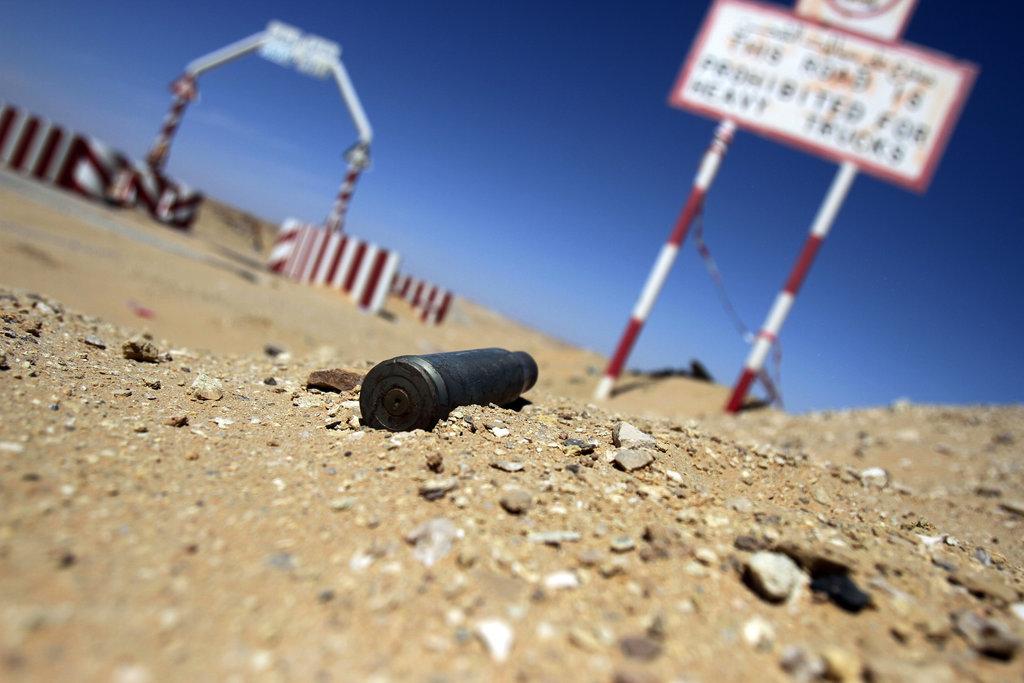Libyan militias’ new strategy: Occupy Oil Field
An empty bullet shell is seen outside the entrance of the al-Ghani oil field, belonging to Libya’s Harouge Oil Operations company, near the city of Waddan in the central Al-Jufrah province on March 23, 2013. Libya plans to invite bids from foreign firms for oil concessions by the end of 2013 as Tripoli wants to increase its OPEC output quota despite conflict with armed militias, strikes and allegations of corruption.
Correspondent Bill Wheeler was awarded the first annual GroundTruth fellowship for field reporting on emerging democracies in the Middle East. In this running blog series for GroundTruth, Wheeler goes inside the militias that are still holding sway in the chaotic aftermath of Libya’s civil war.
TRIPOLI, Libya — Most of Libya’s oil is in the east, and federalist protests there are seen as an existential threat to a unified Libya.
Protests around oil fields have caused a 30 percent drop in production in the last year. In June a self-proclaimed eastern government, denouncing the Political Isolation Law and the armed groups that pushed it, declared the historical eastern region would become autonomous, with its own government and parliament.
Revolutionaries in the east said it was the sight of Tripoli unable to defend itself against armed gangs imposing their will that pushed them to call for their own autonomy, said Mokhtar Lakhdar, a leader in the anti-Gaddafi uprising from the early days of the revolution.
![]()
“They said, ‘listen, we’re well armed too and we’ve got men out here and we can do the same. And we can sit here and occupy the oil fields if we want to as well. At some point we can all do the same. If everyone wants to just exert their power through the muzzle of a gun, it will be a free-for-all.”
And indeed, in a troubling new trend, groups representing cities, tribes or brigades have taken advantage of the state’s weakness, occupying oil installations and shutting down production.
Lakhdar said he no longer blames the east for wanting autonomy: power has always been so concentrated in Tripoli, marginalizing other regions, and so if the state is just going to bend to the will of militias, why not look out for their own livelihoods?
The current chaos offers myriad opportunities for embezzlement; and the camp that triumphs in the power struggle for control of the state will earn diverse opportunities for patronage and corruption. Investment in infrastructure has not begun yet. But public-sector spending has increased dramatically. In 2011 Gaddafi doubled the budget for public-sector salaries.
Since the revolution, successive governments have doled out huge public payouts to boost their own popularity. Last year the public sector salary budget rose to $19 billion, which doesn't even include payments to the roughly 200,000 people who carry arms under the nominal control of the state.
As a member of the Zintan Military Council, Lakhdar oversees some 3,000 or 4,000 fighters, including units that have been involved in clashes over security contracts to protect oil installations. He had recently returned from negotiating one such dispute in the south, and said he thinks that groups are now stirring up tribal tensions over these sites in order to gain leverage over the country’s major resource.
“It’s a huge bargaining chip,” he says.
What the government should have done, said Lakhdar, is implement a weapons buyback early on. While imams came out in sermons against selling weapons, arms sales shifted to the black marked. Lakhdar believes that compensation packages the government paid out to revolutionaries early on allowed people to scam the system, dramatically inflating their rosters and using the money to build their own brigades.
“People are afraid to talk to the media now about these things. Because if you talk about [Abdulrahman] Swehli, or talk about this guy, talk about that guy —now you’re being kidnapped for it. Or killed. We’re regressing, like it's the old regime. This is the reality on the ground right now. The police and the army, they dress in those uniforms. But let’s be honest — there’s no police, there’s no army in Libya. When you are on the ground, you don't see those guys.”
The reality is that it is the tribal elders — not the army or police — that have been keeping the peace. Without a strong government response, the country is headed toward increasing conflict.
This reporting was supported by a grant from The Correspondents Fund.
We want to hear your feedback so we can keep improving our website, theworld.org. Please fill out this quick survey and let us know your thoughts (your answers will be anonymous). Thanks for your time!
